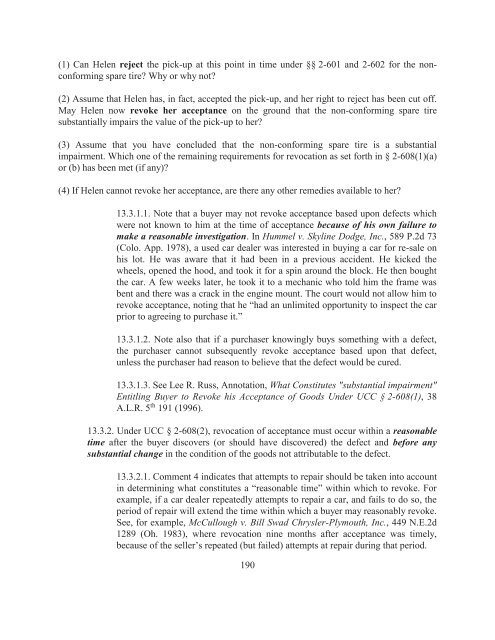Sales and Leases - A Problem-based Approach, 2016a
Sales and Leases - A Problem-based Approach, 2016a
Sales and Leases - A Problem-based Approach, 2016a
Create successful ePaper yourself
Turn your PDF publications into a flip-book with our unique Google optimized e-Paper software.
(1) Can Helen reject the pick-up at this point in time under §§ 2-601 <strong>and</strong> 2-602 for the nonconforming<br />
spare tire? Why or why not?<br />
(2) Assume that Helen has, in fact, accepted the pick-up, <strong>and</strong> her right to reject has been cut off.<br />
May Helen now revoke her acceptance on the ground that the non-conforming spare tire<br />
substantially impairs the value of the pick-up to her?<br />
(3) Assume that you have concluded that the non-conforming spare tire is a substantial<br />
impairment. Which one of the remaining requirements for revocation as set forth in § 2-608(1)(a)<br />
or (b) has been met (if any)?<br />
(4) If Helen cannot revoke her acceptance, are there any other remedies available to her?<br />
13.3.1.1. Note that a buyer may not revoke acceptance <strong>based</strong> upon defects which<br />
were not known to him at the time of acceptance because of his own failure to<br />
make a reasonable investigation. In Hummel v. Skyline Dodge, Inc., 589 P.2d 73<br />
(Colo. App. 1978), a used car dealer was interested in buying a car for re-sale on<br />
his lot. He was aware that it had been in a previous accident. He kicked the<br />
wheels, opened the hood, <strong>and</strong> took it for a spin around the block. He then bought<br />
the car. A few weeks later, he took it to a mechanic who told him the frame was<br />
bent <strong>and</strong> there was a crack in the engine mount. The court would not allow him to<br />
revoke acceptance, noting that he “had an unlimited opportunity to inspect the car<br />
prior to agreeing to purchase it.”<br />
13.3.1.2. Note also that if a purchaser knowingly buys something with a defect,<br />
the purchaser cannot subsequently revoke acceptance <strong>based</strong> upon that defect,<br />
unless the purchaser had reason to believe that the defect would be cured.<br />
13.3.1.3. See Lee R. Russ, Annotation, What Constitutes "substantial impairment"<br />
Entitling Buyer to Revoke his Acceptance of Goods Under UCC § 2-608(1), 38<br />
A.L.R. 5 th 191 (1996).<br />
13.3.2. Under UCC § 2-608(2), revocation of acceptance must occur within a reasonable<br />
time after the buyer discovers (or should have discovered) the defect <strong>and</strong> before any<br />
substantial change in the condition of the goods not attributable to the defect.<br />
13.3.2.1. Comment 4 indicates that attempts to repair should be taken into account<br />
in determining what constitutes a “reasonable time” within which to revoke. For<br />
example, if a car dealer repeatedly attempts to repair a car, <strong>and</strong> fails to do so, the<br />
period of repair will extend the time within which a buyer may reasonably revoke.<br />
See, for example, McCullough v. Bill Swad Chrysler-Plymouth, Inc., 449 N.E.2d<br />
1289 (Oh. 1983), where revocation nine months after acceptance was timely,<br />
because of the seller’s repeated (but failed) attempts at repair during that period.<br />
190


















